2019全国1卷高考英语试题及答案
2019年高考英语全国卷1答案及解析

绝密★启用前 2019年普通高等学校招生全国统一考试(全国卷1)英 语注意事项:1.答卷前,考生务必将自己的姓名、准考证号填写在答题卡上。
2.回答选择题时,选出每小题答案后,用铅笔把答题卡上对应题目的答案标号涂黑。
如需改动,用橡皮擦干净后,再选涂其他答案标号。
回答非选择题时,将答案写在答题卡上,写在本试卷上无效。
3.考试结束后,将本试卷和答题卡一并交回。
第一部分 听力(共两节,满分30分)做题时,先将答案标在试卷上。
录音内容结束后,你将有两分钟的时间将试卷上的答案转涂到答题卡上。
第一节(共5小题;每小题分,满分分)听下面5段对话。
每段对话后有一个小题,从题中所给的A 、B 、C 三个选项中选出最佳选项。
听完每段对话后,你都有10秒钟的时间来回答有关小题和阅读下一小题。
每段对话仅读一遍。
例:How much is the shirtA. £.B. £.C. £.答案是C 。
1. Where does this conversation take place A. In a classroom.B. In a hospital.C.Inamuseum.2. What does Jack want to do A. Take fitness classes. B. Buy a pair of gym shoes. C. Change his work schedule.3. What are the speakers talking about A. What to drink.B. Where to meet.C. When to leave.4. What is the relationship between the speakers A. Colleges.B. Classmates.C. Strangers.5. Why is Emily mentioned in the conversation A. She might want a ticket. B. She is looking for the man. C. She has an extra ticket. 第二节(共15小题,每小题分,满分分)听下面5段对话或独白。
2019年高考英语全国1卷(附答案)
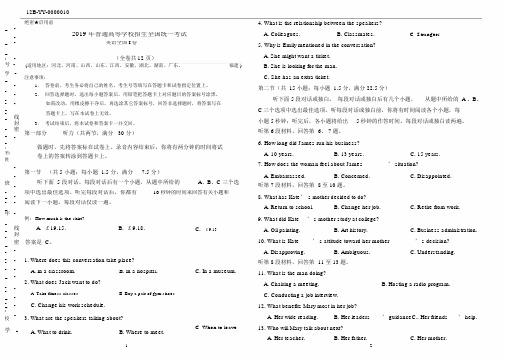
12B-YY-0000010-绝密★启用前__2019 年普通高等学校招生全国统一考试_-__-英语全国I卷__-(全卷共12 页):号 -(适用地区:河北、河南、山西、山东、江西、安徽、湖北、湖南、广东、福建 )学-注意事项:__-1.答卷前,考生务必将自己的姓名、考生号等填写在答题卡和试卷指定位置上。
___-2.回答选择题时,选出每小题答案后,用铅笔把答题卡上对应题目的答案标号涂黑。
___-如需改动,用橡皮擦干净后,再选涂其它答案标号,回答非选择题时,将答案写在___答题卡上,写在本试卷上无效。
_线__封3.考试结束后,将本试卷和答案卡一并交回。
__密_第一部分听力(共两节,满分 30 分)_-__做题时,先将答案标在试卷上。
录音内容结束后,你将有两分钟的时间将试:-名卷上的答案转涂到答题卡上。
姓--第一节(共 5 小题;每小题 1.5 分,满分7.5 分)-听下面 5 段对话。
每段对话后有一个小题,从题中所给的A、B、C 三个选班-__项中选出最佳选项。
听完每段对话后,你都有10 秒钟的时间来回答有关小题和_-__-阅读下一小题。
每段对话仅读一遍。
__4. What is the relationship between the speakers?A. Colleagues.B. Classmates.C. Strangers.5.Why is Emily mentioned in the conversation?A.She might want a ticket.B.She is looking for the man.C.She has an extra ticket.第二节(共 15小题;每小题 1.5分,满分 22.5分)听下面 5段对话或独白。
每段对话或独白后有几个小题,从题中所给的 A 、B、C三个选项中选出最佳选项。
听每段对话或独白前,你将有时间阅读各个小题,每小题 5秒钟;听完后,各小题将给出5秒钟的作答时间。
2019高考英语全国1卷试题+解析
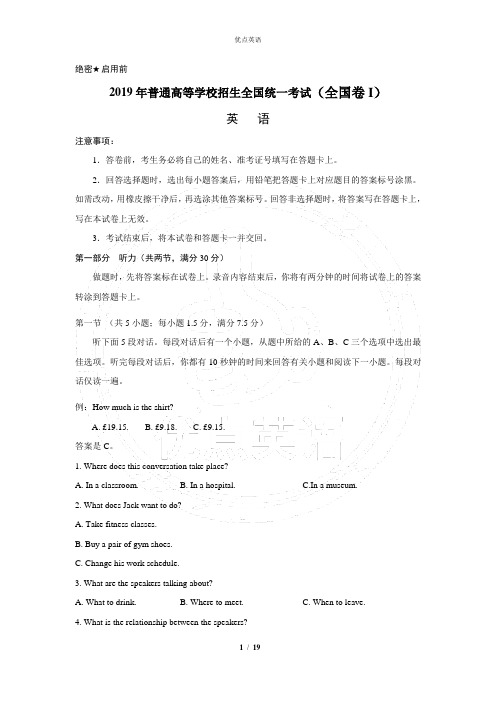
绝密★启用前2019年普通高等学校招生全国统一考试(全国卷I)英语注意事项:1.答卷前,考生务必将自己的姓名、准考证号填写在答题卡上。
2.回答选择题时,选出每小题答案后,用铅笔把答题卡上对应题目的答案标号涂黑。
如需改动,用橡皮擦干净后,再选涂其他答案标号。
回答非选择题时,将答案写在答题卡上,写在本试卷上无效。
3.考试结束后,将本试卷和答题卡一并交回。
第一部分听力(共两节,满分30分)做题时,先将答案标在试卷上。
录音内容结束后,你将有两分钟的时间将试卷上的答案转涂到答题卡上。
第一节(共5小题;每小题1.5分,满分7.5分)听下面5段对话。
每段对话后有一个小题,从题中所给的A、B、C三个选项中选出最佳选项。
听完每段对话后,你都有10秒钟的时间来回答有关小题和阅读下一小题。
每段对话仅读一遍。
例:How much is the shirt?A. £19.15.B. £9.18.C. £9.15.答案是C。
1. Where does this conversation take place?A. In a classroom.B. In a hospital.C.In a museum.2. What does Jack want to do?A. Take fitness classes.B. Buy a pair of gym shoes.C. Change his work schedule.3. What are the speakers talking about?A. What to drink.B. Where to meet.C. When to leave.4. What is the relationship between the speakers?A. Colleges.B. Classmates.C. Strangers.5. Why is Emily mentioned in the conversation?A. She might want a ticket.B. She is looking for the man.C. She has an extra ticket.第二节(共15小题,每小题1.5分,满分22.5分)听下面5段对话或独白。
(完整)2019年高考英语全国卷I及答案
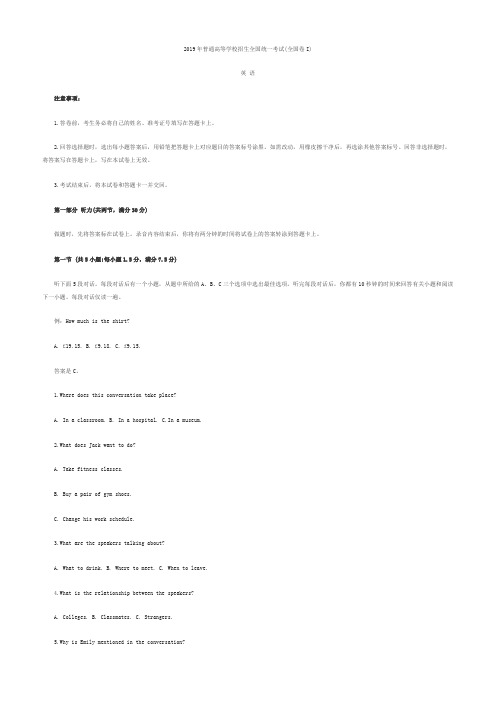
2019年普通高等学校招生全国统一考试(全国卷I)英语注意事项:1.答卷前,考生务必将自己的姓名、准考证号填写在答题卡上。
2.回答选择题时,选出每小题答案后,用铅笔把答题卡上对应题目的答案标号涂黑。
如需改动,用橡皮擦干净后,再选涂其他答案标号。
回答非选择题时,将答案写在答题卡上,写在本试卷上无效。
3.考试结束后,将本试卷和答题卡一并交回。
第一部分听力(共两节,满分30分)做题时,先将答案标在试卷上。
录音内容结束后,你将有两分钟的时间将试卷上的答案转涂到答题卡上。
第一节 (共5小题;每小题1.5分,满分7.5分)听下面5段对话。
每段对话后有一个小题,从题中所给的A、B、C三个选项中选出最佳选项。
听完每段对话后,你都有10秒钟的时间来回答有关小题和阅读下一小题。
每段对话仅读一遍。
例:How much is the shirt?A. £19.15.B. £9.18.C. £9.15.答案是C。
1.Where does this conversation take place?A. In a classroom.B. In a hospital.C.In a museum.2.What does Jack want to do?A. Take fitness classes.B. Buy a pair of gym shoes.C. Change his work schedule.3.What are the speakers talking about?A. What to drink.B. Where to meet.C. When to leave.4.What is the relationship between the speakers?A. Colleges.B. Classmates.C. Strangers.5.Why is Emily mentioned in the conversation?A. She might want a ticket.B. She is looking for the man.C. She has an extra ticket.第二节(共15小题,每小题1.5分,满分22.5分)听下面5段对话或独白。
(完整版)2019年全国高考英语卷1(附答案)

2019年普通高等学校招生全国统一考试(全国卷I)英 语注意事项:1.答卷前,考生务必将自己的姓名、准考证号填写在答题卡上。
2.回答选择题时,选出每小题答案后,用铅笔把答题卡上对应题目的答案标号涂黑。
如需改动,用橡皮擦干净后,再选涂其他答案标号。
回答非选择题时,将答案写在答题卡上,写在本试卷上无效。
3.考试结束后,将本试卷和答题卡一并交回。
第一部分 听力(共两节,满分30分)做题时,先将答案标在试卷上。
录音内容结束后,你将有两分钟的时间将试卷上的答案转涂到答题卡上。
第一节 (共5小题;每小题1.5分,满分7.5分)听下面5段对话。
每段对话后有一个小题,从题中所给的A、B、C三个选项中选出最佳选项。
听完每段对话后,你都有10秒钟的时间来回答有关小题和阅读下一小题。
每段对话仅读一遍。
例:How much is the shirt?A. £19.15.B. £9.18.C. £9.15.答案是C。
1.Where does this conversation take place?A. In a classroom.B. In a hospital.C.In a museum.2.What does Jack want to do?A. Take fitness classes.B. Buy a pair of gym shoes.C. Change his work schedule.3.What are the speakers talking about?A. What to drink.B. Where to meet.C. When to leave.4.What is the relationship between the speakers?A. Colleges.B. Classmates.C. Strangers.5.Why is Emily mentioned in the conversation?A. She might want a ticket.B. She is looking for the man.C. She has an extra ticket.第二节(共15小题,每小题1.5分,满分22.5分)听下面5段对话或独白。
2019年高考英语全国1卷(附答案)
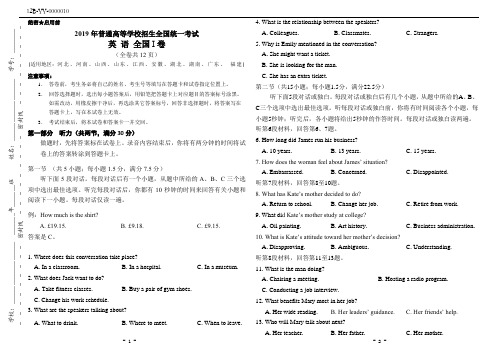
学校:____________________ _______年_______班 姓名:____________________ 学号:________- - - - - - - - - 密封线 - - - - - - - - - 密封线 - - - - - - - - -绝密★启用前2019年普通高等学校招生全国统一考试英 语 全国I 卷(全卷共12页)(适用地区:河北、河南、山西、山东、江西、安徽、湖北、湖南、广东、 福建) 注意事项:1.答卷前,考生务必将自己的姓名、考生号等填写在答题卡和试卷指定位置上。
2. 回答选择题时,选出每小题答案后,用铅笔把答题卡上对应题目的答案标号涂黑。
如需改动,用橡皮擦干净后,再选涂其它答案标号,回答非选择题时,将答案写在答题卡上,写在本试卷上无效。
3.考试结束后,将本试卷和答案卡一并交回。
第一部分 听力(共两节,满分30分)做题时,先将答案标在试卷上。
录音内容结束后,你将有两分钟的时间将试卷上的答案转涂到答题卡上。
第一节 (共5小题;每小题1.5分,满分7.5分)听下面5段对话。
每段对话后有一个小题,从题中所给的A 、B 、C 三个选项中选出最佳选项。
听完每段对话后,你都有10秒钟的时间来回答有关小题和阅读下一小题。
每段对话仅读一遍。
例:How much is the shirt?A. £19.15.B. £9.18.C. £9.15.答案是C 。
1. Where does this conversation take place? A. In a classroom. B. In a hospital.C. In a museum.2. What does Jack want to do?A. Take fitness classes.B. Buy a pair of gym shoes.C. Change his work schedule. 3. What are the speakers talking about? A. What to drink.B. Where to meet.C. When to leave.4. What is the relationship between the speakers?A. Colleagues.B. Classmates.C. Strangers.5. Why is Emily mentioned in the conversation? A. She might want a ticket.B. She is looking for the man.C. She has an extra ticket.第二节(共15小题;每小题1.5分,满分22.5分)听下面5段对话或独白。
(完整版)2019年高考英语全国卷I及答案

2019年普通高等学校招生全国统一考试(全国卷I)英语注意事项:1.答卷前,考生务必将自己的姓名、准考证号填写在答题卡上。
2.回答选择题时,选出每小题答案后,用铅笔把答题卡上对应题目的答案标号涂黑。
如需改动,用橡皮擦干净后,再选涂其他答案标号。
回答非选择题时,将答案写在答题卡上,写在本试卷上无效。
3.考试结束后,将本试卷和答题卡一并交回。
第一部分听力(共两节,满分30分)做题时,先将答案标在试卷上。
录音内容结束后,你将有两分钟的时间将试卷上的答案转涂到答题卡上。
第一节 (共5小题;每小题1.5分,满分7.5分)听下面5段对话。
每段对话后有一个小题,从题中所给的A、B、C三个选项中选出最佳选项。
听完每段对话后,你都有10秒钟的时间来回答有关小题和阅读下一小题。
每段对话仅读一遍。
例:How much is the shirt?A. £19.15.B. £9.18.C. £9.15.答案是C。
1.Where does this conversation take place?A. In a classroom.B. In a hospital.C.In a museum.2.What does Jack want to do?A. Take fitness classes.B. Buy a pair of gym shoes.C. Change his work schedule.3.What are the speakers talking about?A. What to drink.B. Where to meet.C. When to leave.4.What is the relationship between the speakers?A. Colleges.B. Classmates.C. Strangers.5.Why is Emily mentioned in the conversation?A. She might want a ticket.B. She is looking for the man.C. She has an extra ticket.第二节(共15小题,每小题1.5分,满分22.5分)听下面5段对话或独白。
2019年高考英语全国卷1试题卷(全国卷I含答案和解析)
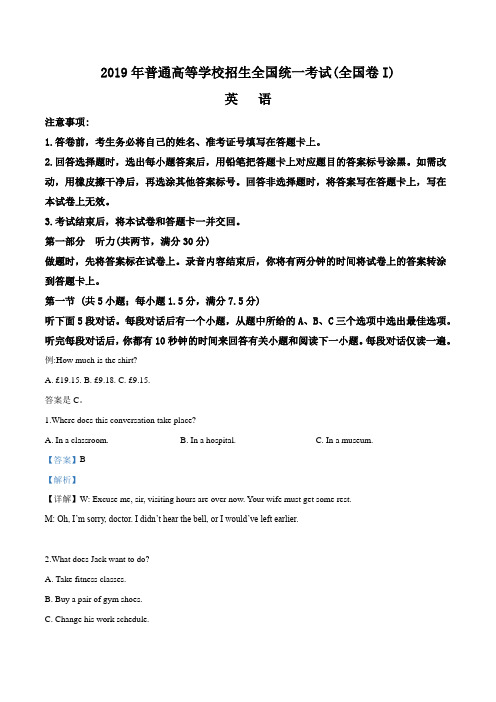
2019年普通高等学校招生全国统一考试(全国卷I)英语注意事项:1.答卷前,考生务必将自己的姓名、准考证号填写在答题卡上。
2.回答选择题时,选出每小题答案后,用铅笔把答题卡上对应题目的答案标号涂黑。
如需改动,用橡皮擦干净后,再选涂其他答案标号。
回答非选择题时,将答案写在答题卡上,写在本试卷上无效。
3.考试结束后,将本试卷和答题卡一并交回。
第一部分听力(共两节,满分30分)做题时,先将答案标在试卷上。
录音内容结束后,你将有两分钟的时间将试卷上的答案转涂到答题卡上。
第一节 (共5小题;每小题1.5分,满分7.5分)听下面5段对话。
每段对话后有一个小题,从题中所给的A、B、C三个选项中选出最佳选项。
听完每段对话后,你都有10秒钟的时间来回答有关小题和阅读下一小题。
每段对话仅读一遍。
例:How much is the shirt?A. £19.15.B. £9.18.C. £9.15.答案是C。
1.Where does this conversation take place?A. In a classroom.B. In a hospital.C. In a museum.【答案】B【解析】【详解】W: Excuse me, sir, visiting hours are over now. Your wife must get some rest.M: Oh, I’m sorry, doctor. I didn’t hear the bell, or I would’ve left earlier.2.What does Jack want to do?A. Take fitness classes.B. Buy a pair of gym shoes.C. Change his work schedule.【答案】A【解析】【详解】M: Hello, my name is Jack. I need to get in shape. How do I register for the classes?W: We’ll need you to join the gym, and then you can find out which classes fit your schedule the best.3.What are the speakers talking about?A. What to drink.B. Where to meet.C. When to leave. 【答案】B 【解析】【详解】W: I’ll see you at the theatre.M: Better still, let’s meet in the Red Lion bar to have a little nice talk.W: Good idea, and I’d love to have a drink there.4.What is the relationship between the speakers? A. Colleges. B. Classmates. C. Strangers. 【答案】C 【解析】【详解】M: Hello, my name is John Arber. And I’m calling to ask about the position advertised in Friday’sDailyMail.W: Yes, the position is still open. You could come over and have a talk with us.5.Why is Emily mentioned in the conversation?A. She might want a ticket.B. She is looking for the man.C. She has an extra ticket【答案】A【解析】【详解】M: I have an extra ticket to the concert tonight. Would you like to join me?W: Thanks, but I already have one. You can ask Emily. She might be interested.第二节(共15小题,每小题1.5分,满分22.5分)听下面5段对话或独白。
- 1、下载文档前请自行甄别文档内容的完整性,平台不提供额外的编辑、内容补充、找答案等附加服务。
- 2、"仅部分预览"的文档,不可在线预览部分如存在完整性等问题,可反馈申请退款(可完整预览的文档不适用该条件!)。
- 3、如文档侵犯您的权益,请联系客服反馈,我们会尽快为您处理(人工客服工作时间:9:00-18:30)。
绝密★启用前2019年普通高等学校招生全国统一考试(全国卷I)英语注意事项:1.答卷前,考生务必将自己的姓名、准考证号填写在答题卡上。
2.回答选择题时,选出每小题答案后,用铅笔把答题卡上对应题目的答案标号涂黑。
如需改动,用橡皮擦干净后,再选涂其他答案标号。
回答非选择题时,将答案写在答题卡上,写在本试卷上无效。
3.考试结束后,将本试卷和答题卡一并交回。
第一部分听力(共两节,满分30分)做题时,先将答案标在试卷上。
录音内容结束后,你将有两分钟的时间将试卷上的答案转涂到答题卡上。
第一节 (共5小题;每小题1.5分,满分7.5分)听下面5段对话。
每段对话后有一个小题,从题中所给的A、B、C三个选项中选出最佳选项。
听完每段对话后,你都有10秒钟的时间来回答有关小题和阅读下一小题。
每段对话仅读一遍。
例:How much is the shirt?A. £19.15.B. B. £9.18.C. C. £9.15.答案是C。
1.Where does this conversation take place?A. In a classroom.B. In a hospital.C.In a museum.2.What does Jack want to do?A. Take fitness classes.B. Buy a pair of gym shoes.C. Change his work schedule.3.What are the speakers talking about?A. What to drink.B. Where to meetC. When to leave.4.What is the relationship between the speakers?A. Colleges.B. Classmates.C. Strangers.5.Why is Emily mentioned in the conversation?A. She might want a ticket.B. She is looking for the man.C. She has an extra ticket.第二节(共15小题,每小题1.5分,满分22.5分)听下面5段对话或独白。
每段对话或独白后有几个小题,从题中所给的A、B、C三个选项中选出最佳选项。
听每段对话或独白前,你将有时间阅读各个小题,每小题5秒钟;听完后,各小题将给出5秒钟的作答时间。
每段对话或独白读两遍。
听第6段材料,回答第6、7题。
6.How long did James run his business?A.10 years.B.13years.C.15 years.7.How does the woman feel about James' situation?A. Embarrassed.B. Concerned.C. Disappointed.听第7段材料,回答第8至10题。
8.What has Kate's mother decided to do?A. Return to school.B. Change her job.C. Retire from work.9.What did Kate's mother study at college?A. Oil painting.B. Art history.C. Business administration.10.What is Kate's attitude toward her mother's decision?A. Disapproving.B. Ambiguous.C. Understanding.听第8段材料,回答第11至13题。
11.What is the man doing?A. Chairing a meeting.B. Hosting a radio program.C. Conducting a job interview.12.What benefits Mary most in her job?A. Her wide reading.B. Her leaders' guidance.C. Her friends' help13.Who will Mary talk about next?A. Her teacher.B. Her fatherC. Her mother.听第9段材料,回答第14至17题。
14.Why does the man seldom do exercise?A. He lacks motivation.B. He has a heart problem.C. He works all the time.15.What does Jacob Sattelmair probably do?A. He's an athlete.B. He's a researcher.C. He's a journalist.16.Why does the woman speak of a study?A. To encourage the man.B. To recommend an exercise.C. To support her findings.17.How much time will the man probably spend exercising weekly?A.300 minutes.B.150 minute.C.75 minutes.听第10段材料,回答第18至20题。
18.What did the scientists do to the road?A. They repaired it.B. They painted it.C. They blocked it19.Why are young birds drawn to the road surface?A. It's warm.B. It's brown.C. It's smooth.20.What is the purpose of the scientists' experiment?A. To keep the birds there for a whole year.B. To help students study the birds well.C. To prevent the birds from being killed.第二部分阅读理解(共两节,满分40分)第一节 (共15小题;每小题2分,满分30分)阅读下列短文,从每题所给的A、B、C和D四个选项中,选出最佳选项。
ANeed a Job This Summer?The provincial government and its partners offer many programs to help students find summer jobs. The deadlines and what you need to apply depend on the program.Not a student? Go to the government website to learn about programs and online tools available to help people under 30 build skills, find a job or start businesses all year round.Jobs for YouthIf you are a teenager living in certain parts of the province, you could be eligible(符合条件)for this program. Which provides eight weeks of paid employment along with training.Who is eligible: Youth 15-18 years old in select communities(社区).Summer CompanySummer Company provides students with hands-on business training and awards of up to $3,000 to start and run their own summer businesses.Who is eligible: Students aged 15-29, returning to school in the fall.Stewardship Youth Ranger ProgramYou could apply to be a Stewardship Youth Ranger and work on local natural resource management projects for eight weeks this summer.Who is eligible: Students aged 16 or 17 at time of hire, but not turning 18 before December 31 this year.Summer Employment Opportunities(机会)Through the Summer Employment Opportunities program, students are hired each year in a variety of summer positions across the Provincial Public Service, its related agencies and community groups.Who is eligible: Students aged 15 or older. Some positions require students to be 15 to 24 or up to 29 for persons with a disability.21. What is special about Summer Company?A. It requires no training before employment.B. It provides awards for running new businesses.C. It allows one to work in the natural environment.D. It offers more summer job opportunities.22. What is the age range required by Stewardship Youth Ranger Program?A.15-18.B.15-24.C.15-29.D.16-17.23. Which program favors the disabled?A. Jobs for Youth.B. Summer Company.C. Stewardship Youth Ranger Program.D. Summer Employment Opportunities.BFor Canaan Elementary’s second grade in Patchogue, N.Y.,today is speech day ,and right now it’s Chris Palaez’s turn. The 8-year-old is the joker of the class. With shining dark eyes, he seems like the of kid who would enjoy public speaking.But he’s, nervous.“I’m here to tell you today why you should … should…”Chris trips on the“-ld,”a. pronunciation difficulty for many non-native English speakers. His teacher ,Thomas Whaley ,is next to him, whispering support.“…Vote for …me …”Except for some stumbles, Chris is doing amazingly well. When he brings his speech to a nice conclusion ,Whaley invites the rest of the class to praise him.A son of immigrants, Chris stared learning English a little over three years ago. Whaley recalls(回想起)how at the beginning of the year,when called upon to read,Chris would excuse himself to go to the bathroom.Learning English as a second language can be a painful experience. What you need is a great teacher who lets you make mistakes. “It takes a lot for any student,” Whaley explains,“especially for a student who is learning English as their new language,to feel confident enough to say,‘I don’t know,but I want to know.’”Whaley got the idea of this second-grade presidential campaign project when he asked the children one day to raise their hands if they thought they could never be a president. The answer broke his heart. Whaley says the project is about more than just learning to read and speak in public. He wants these kids to learn to boast(夸耀)about themselves.“Boasting about yourself,and your best qualities,” Whaley says,“is very difficult for a child who came into the classroom not feeling confident.”24. What made Chris nervous?A. Telling a story.B. Making a speech.C. Taking a test.D. Answering a question.25. What does the underlined word “stumbles” in paragraph 2 refer to?A. Improper pauses.B. Bad manners.C. Spelling mistakes.D. Silly jokes.26. We can infer that the purpose of Whaley’s project is to _________.A. help students see their own strengthsB. assess students’ public speaking skillsC. prepare students for their future jobsD. inspire students’ love for politics27. Which of the following best describes Whaley as a teacher?A. Humorous.B. Ambitious.C. Caring.D. Demanding.CAs data and identity theft becomes more and more common, the market is growing for biometric(生物测量)technologies—like fingerprint scans—to keep others out of private e-spaces. At present, these technologies are still expensive, though.Researchers from Georgia Tech say that they have come up with a low-cost device(装置)that gets around this problem: a smart keyboard. This smart keyboard precisely measures the cadence(节奏)with which one types and the pressure fingers apply to each key. The keyboard could offer astrong layer of security by analyzing things like the force of a user's typing and the time between key presses. These patterns are unique to each person. Thus, the keyboard can determine people's identities, and by extension, whether they should be given access to the computer it's connected to—regardless of whether someone gets the password right.It also doesn't require a new type of technology that people aren't already familiar with. Everybody uses a keyboard and everybody types differently.In a study describing the technology, the researchers had 100 volunteers type the word “touch”four times using the smart keyboard. Data collected from the device could be used to recognize different participants based on how they typed, with very low error rates. The researchers say that the keyboard should be pretty straightforward to commercialize and is mostly made of inexpensive, plastic-like parts. The team hopes to make it to market in the near future.28. Why do the researchers develop the smart keyboard?A. To reduce pressure on keys.B. To improve accuracy in typingC. To replace the password system.D. To cut the cost of e-space protection.29. What makes the invention of the smart keyboard possible?A. Computers are much easier to operate.B. Fingerprint scanning techniques develop fast.C. Typing patterns vary from person to person.D. Data security measures are guaranteed.30. What do the researchers expect of the smart keyboard?all 1o soisgitieoco oll.A. It'll be environment-friendly.B. It'll reach consumers soon.C. It'll be made of plastics.D. It'll help speed up typing.31. Where is this text most likely from?A. A diary.B.A guidebookC. A novel.D. A magazine.DDuring the rosy years of elementary school(小学), I enjoyed sharing my dolls and jokes, which allowed me to keep my high social status. I was the queen of the playground. Then came my tweens and teens, and mean girls and cool kids. They rose in the ranks not by being friendly but by smokingcigarettes, breaking rules and playing jokes on others, among whom I soon found myself.Popularity is a well-explored subject in social psychology. Mitch Prinstein, a professor of clinical psychology sorts the popular into two categories: the likable and the status seekers. The likables’plays-well-with-others qualities strengthen schoolyard friendships, jump-start interpersonal skills and, when tapped early, are employed ever after in life and work. Then there’s the kind of popularity that appears in adolescence: status born of power and even dishonorable behavior.Enviable as the cool kids m ay have seemed, Dr. Prinstein’s studies show unpleasant consequences. Those who were highest in status in high school, as well as those least liked in elementary school, are “most likely to engage(从事)in dangerous and risky behavior.”In one study, Dr. Prinstein examined the two types of popularity in 235 adolescents, scoring the least liked, the most liked and the highest in status based on student surveys(调查研究). “We found that the least well-liked teens had become more aggressive over time toward their classmates. But so had those who were high in status. It clearly showed that while likability can lead to healthy adjustment, high status has just the opposite effect on us."Dr. Prinstein has also found that the qualities that made the neighbors want you on a play date-sharing, kindness, openness —carry over to later years and make you better able to relate and connect with others.In analyzing his and other research,Dr. Prinstein came to another conclusion: Not only is likability related to positive life outcomes, but it is also responsible for those outcomes, too. "Being liked creates opportunities for learning and for new kinds of life experiences that help somebody gain an advantage, ” he said.32. What sort of girl was the author in her early years of elementary school?A. Unkind.B. Lonely.C. Generous.D. Cool.33.What is the second paragraph mainly about?A. The classification of the popular.B. The characteristics of adolescents.C. The importance of interpersonal skills.D. The causes of dishonorable behavior.34. What did Dr. Prinstein’s study find about the most liked kids?A. They appeared to be aggressive.B. They tended to be more adaptable.C. They enjoyed the highest status.D. They performed well academically.35. What is the best title for the text?A. Be Nice-You Won’t Finish LastB. The Higher the Status, the BeerC. Be the Best-You Can Make ItD. More Self-Control, Less Aggressiveness第二节 (共5小题;每小题2分,满分10分)根据短文内容,从短文后的选项中选出能填入空白处的最佳选项。
